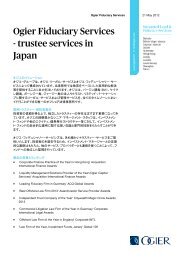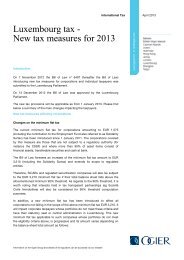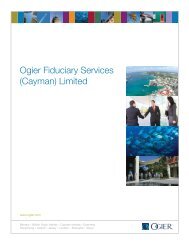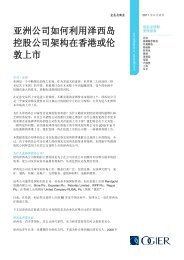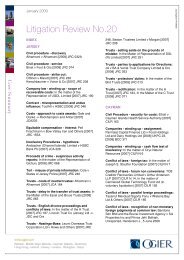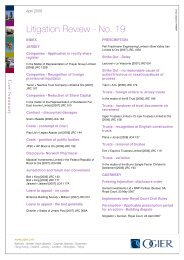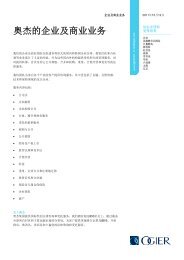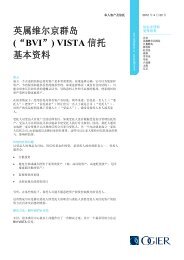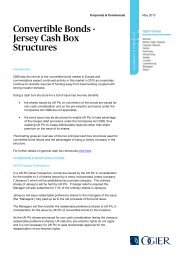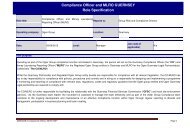Focus Report on Regulation - Going through a seismic shift - Ogier
Focus Report on Regulation - Going through a seismic shift - Ogier
Focus Report on Regulation - Going through a seismic shift - Ogier
Create successful ePaper yourself
Turn your PDF publications into a flip-book with our unique Google optimized e-Paper software.
<str<strong>on</strong>g>Focus</str<strong>on</strong>g> <str<strong>on</strong>g>Report</str<strong>on</strong>g>:<br />
Sp<strong>on</strong>sored by<br />
Regulati<strong>on</strong><br />
<strong>Going</strong> Through<br />
A Seismic Shift<br />
Special <str<strong>on</strong>g>Report</str<strong>on</strong>g><br />
Fr<strong>on</strong>tiers Come Down in New World<br />
Order – Pages II-III<br />
Sp<strong>on</strong>sored Feature Article<br />
A Haven for an Industry Under Siege<br />
– Pages IV-V
II <str<strong>on</strong>g>Focus</str<strong>on</strong>g> report: Regulati<strong>on</strong><br />
September<br />
24, 2012<br />
Fr<strong>on</strong>tiers Come<br />
Down in New<br />
World Order<br />
Recent years have witnessed the<br />
emergence of several significant<br />
pieces of regulati<strong>on</strong> with potentially<br />
<strong>seismic</strong> implicati<strong>on</strong>s for the private<br />
equity industry. Yet with certain<br />
key provisi<strong>on</strong>s still being debated,<br />
managers are struggling to prepare<br />
themselves, writes Solom<strong>on</strong> Teague<br />
At times it must feel like an earthquake, so<br />
much does the regulatory ground beneath the<br />
feet of private equity managers move. In the<br />
five years since the credit markets first froze,<br />
regulators have been shoring up regimes in a<br />
process of almost c<strong>on</strong>tinuous discussi<strong>on</strong> and<br />
change. And though the source of the crisis<br />
was undoubtedly in banking, the alternative<br />
investment fund industry has been at the heart<br />
of regulatory change.<br />
“The problem is regulati<strong>on</strong> is such a moving<br />
target,” said Iain Bannatyne, a Partner at<br />
KPMG. “Things are changing all the time and<br />
there is a lack of clarity still with much of what<br />
is coming out. It is a major jolt for the industry,<br />
having come out of a comparatively benign<br />
period for regulati<strong>on</strong>, to have to deal with the<br />
avalanche of regulati<strong>on</strong> we have now.”<br />
Mike Newell, Partner at law firm Nort<strong>on</strong><br />
Rose, added: “Only a hard-core minority disagree<br />
with the principles of regulati<strong>on</strong> outlined<br />
at the G20 level, but the U.S. and E.U. have<br />
moved to achieve those goals independently<br />
and that has not been helpful.”<br />
With private equity houses becoming increasingly<br />
instituti<strong>on</strong>alised and global, in terms<br />
of investment and capital raising, it is almost<br />
impossible for big funds to avoid regulati<strong>on</strong> c<strong>on</strong>cocted<br />
in either the U.S. or Europe, regardless<br />
of where they are based, Mr. Newell said.<br />
Disparate Approaches<br />
The approaches of regulators in the U.S. and<br />
Europe “are too disparate for them to achieve<br />
any unity of purpose within any reas<strong>on</strong>able<br />
time frame,” added Mr. Newell. “But the industry<br />
will make it work more efficiently over<br />
time. Industry bodies and advisers will come<br />
up with ways to satisfy all regulati<strong>on</strong>s, and<br />
will fill in any gaps themselves with best<br />
practice.”<br />
In Europe the new regulati<strong>on</strong> of private<br />
equity has taken the form of the Alternative<br />
Regulati<strong>on</strong> is such a moving target…<br />
things are changing all the time and<br />
there is a lack of clarity with much of<br />
what is coming out<br />
Iain Bannatyne, KPMG<br />
Investment Fund Managers Directive. Despite<br />
the first draft having been published in<br />
2009, there are still clauses of the Directive<br />
being amended and haggled over. The Directive<br />
officially came into force <strong>on</strong> July 21, 2011<br />
and member states have until July 22, 2013<br />
to implement it into nati<strong>on</strong>al law. A year later<br />
managers need to be authorised under the Directive<br />
by their home state regulator.<br />
Stage Three of the process, when nati<strong>on</strong>al<br />
regulators interpret and implement the Directive<br />
in their own territories, will be decisive,<br />
giving industry answers to many of the remaining<br />
questi<strong>on</strong>s. But there are doubts as to<br />
whether the Stage Three target will be hit <strong>on</strong><br />
time, with rumours currently circulating that<br />
the September deadline for the latest draft will<br />
be missed.<br />
Industry sources c<strong>on</strong>tinue to protest that<br />
the rules appear to have been drafted without<br />
due regard for the mechanics of the private<br />
equity – or hedge fund – industries. AIFMD<br />
requires all alternative funds use a depository,<br />
for example, despite this being more relevant<br />
for hedge funds than private equity funds.<br />
“The feeling is this requirement does not address<br />
the real underlying risk and is disproporti<strong>on</strong>ate,”<br />
said Mr. Bannatyne. “It is a huge<br />
administrative challenge and an extra cost, and<br />
it is not clear how the depositories themselves<br />
will manage the risk.”<br />
AIFMD requires private equity funds to
September 24, 2012<br />
<str<strong>on</strong>g>Focus</str<strong>on</strong>g> report: Regulati<strong>on</strong> III<br />
Flying the flag: the U.S. in particular has g<strong>on</strong>e<br />
global with the scope of its regulati<strong>on</strong>s<br />
the SEC’s investment rulebook, bringing private<br />
equity funds into the same sphere as U.S.<br />
retail funds, with an associated compliance<br />
cost. Managers are now preparing to meet<br />
the SEC’s new Form PF filing deadline, which<br />
requires a level of detail that many advisers<br />
believe is unprecedented, with roughly 1,600<br />
data points, according to KPMG.<br />
Arguably even more extraterritorial in its<br />
scope than the AIFMD is FATCA, the U.S. tax<br />
rule that demands all funds disclose details<br />
about transacti<strong>on</strong>s with U.S. investors to the<br />
Internal Revenue Service. Entities that decline<br />
to provide such details will be subject to<br />
a 30% withholding tax – essentially a penalty.<br />
This will be levied <strong>on</strong> their interests in U.S.<br />
companies, both <strong>on</strong> <strong>on</strong>going payments, such as<br />
dividends, and <strong>on</strong> gross proceeds at the point<br />
of sale.<br />
Evolving regulati<strong>on</strong> will also impact the<br />
European insurance and pensi<strong>on</strong> industries<br />
hold capital against their investments, even<br />
though such funds do not take proprietary risk,<br />
meaning funds will need to set aside at least a<br />
quarter of their fixed overhead costs, said J<strong>on</strong><br />
Wils<strong>on</strong>, Director of Project C<strong>on</strong>sulting at The<br />
IMS Group, a regulatory c<strong>on</strong>sultancy firm.<br />
Even more c<strong>on</strong>tentious are rules governing<br />
remunerati<strong>on</strong>, particularly deferred payments.<br />
There are questi<strong>on</strong>s as to how this can be applied<br />
to private equity, where payment is already<br />
deferred to the point at which portfolio<br />
companies are sold and profit realised.<br />
Exactly how regulators will judge how much<br />
business needs to be d<strong>on</strong>e <strong>on</strong>shore or offshore<br />
to qualify for different tax treatment also remains<br />
ambiguous, as do the specifics around<br />
a host of exempti<strong>on</strong>s, <strong>on</strong> holding companies,<br />
joint ventures, family office vehicles, insurance<br />
c<strong>on</strong>tracts and securitisati<strong>on</strong> special purposes<br />
entities.<br />
Until the details <strong>on</strong> AIFMD in particular are<br />
finalised it will be impossible for managers to<br />
take key decisi<strong>on</strong>s that will determine the future<br />
shape of their business, such as whether<br />
entities and management teams need to be<br />
relocated, and whether to c<strong>on</strong>tinue accepting<br />
investors from certain jurisdicti<strong>on</strong>s, said<br />
Newell.<br />
Managers must also be aware of various<br />
other initiatives, for example the Financial<br />
C<strong>on</strong>glomerates Directive, known as FiCOD,<br />
which has been around for years but has been<br />
updated to bring private equity funds within<br />
its purview. The industry has also been<br />
caught within the scope of Dodd Frank and<br />
the Foreign Account Tax Compliance Act, a<br />
U.S. measure designed to compel n<strong>on</strong>-U.S.<br />
financial instituti<strong>on</strong>s to provide informati<strong>on</strong><br />
<strong>on</strong> any U.S. client which has $50,000 or more<br />
invested, with potentially enormous compliance<br />
implicati<strong>on</strong>s.<br />
<strong>Going</strong> Bey<strong>on</strong>d Jurisdicti<strong>on</strong>s<br />
Regulators are in no mood to c<strong>on</strong>fine their attenti<strong>on</strong>s<br />
within their own borders, with the latest<br />
wave of regulati<strong>on</strong>s notable for the impact<br />
they will have bey<strong>on</strong>d the reaches of their home<br />
jurisdicti<strong>on</strong>s. AIFMD prevents n<strong>on</strong>-E.U. based<br />
asset managers from marketing their products<br />
in the E.U. unless they comply with E.U.<br />
rules and will be felt acutely by many managers<br />
themselves not operating in Europe.<br />
Dodd Frank is lighter touch outside the U.S.,<br />
with most mid-market and leveraged buyout<br />
funds outside the country classified as Exempt<br />
<str<strong>on</strong>g>Report</str<strong>on</strong>g>ing Advisers, with <strong>on</strong>ly partial SEC supervisi<strong>on</strong>.<br />
In practise such funds are required<br />
to make fairly detailed disclosures, but without<br />
too big an impact <strong>on</strong> the operati<strong>on</strong>al side of the<br />
business.<br />
Registered Investment Advisers, <strong>on</strong> the<br />
other hand, comprising most U.S. funds and<br />
the largest foreign funds, must comply with<br />
Only a hard-core<br />
minority disagree<br />
with the principles<br />
of regulati<strong>on</strong><br />
outlined at the<br />
G20 level, but the<br />
U.S. and E.U.<br />
have moved to<br />
achieve those goals<br />
independently<br />
Mike Newell,<br />
Nort<strong>on</strong> Rose<br />
– both with heavy historical commitments to<br />
private equity. Solvency II, a European initiative<br />
setting out the solvency requirements of<br />
insurance companies, is also set to have a significant<br />
impact <strong>on</strong> all private equity funds, said<br />
Mr. Bannatyne.<br />
“Discussi<strong>on</strong>s c<strong>on</strong>tinue <strong>on</strong> the risk classificati<strong>on</strong><br />
which will be attributable to private equity<br />
investments which will determine the capital<br />
requirements set against such investments,<br />
potentially discouraging allocati<strong>on</strong>s,” he said.<br />
With all this regulati<strong>on</strong> taken together, matters<br />
are complicated by the fact that different<br />
legal advisers are reaching different c<strong>on</strong>clusi<strong>on</strong>s<br />
about what private equity funds must do<br />
to comply, said Mr. Wils<strong>on</strong>.<br />
“I hope that even if AIFMD does cause<br />
some pain at the implementati<strong>on</strong> stage, in<br />
terms of <strong>on</strong>going costs it will be manageable,<br />
and will not interfere significantly with fund<br />
operati<strong>on</strong>s,” said Mr. Bannatyne. “I think<br />
there is much more uncertainty in the U.S. for<br />
RIAs in terms of <strong>on</strong>going compliance costs and<br />
how U.S. rules might impact how they manage<br />
their business.”
IV <str<strong>on</strong>g>Focus</str<strong>on</strong>g> report: Sp<strong>on</strong>sored Article<br />
September<br />
24, 2012<br />
Europe’s markets have had<br />
a torrid few years but while<br />
many investors have run<br />
for the exits, others have<br />
recognised the moment<br />
to be a major buying<br />
opportunity. For foreign<br />
private equity managers<br />
looking to invest in Europe,<br />
the Channel Islands provide<br />
a tried and tested route,<br />
write Jane Pearce, Group<br />
Director of <strong>Ogier</strong> Fund<br />
Services<br />
and Tim<br />
Morgan,<br />
Partner of<br />
<strong>Ogier</strong> in<br />
Jersey<br />
A Haven for<br />
an Industry<br />
Under Siege<br />
Feature Article<br />
Sp<strong>on</strong>sored by<br />
Despite the c<strong>on</strong>stant stream of negative news from<br />
Europe, the unrelenting threat of downgrades from<br />
the rating agencies, the attenti<strong>on</strong> of the IMF and<br />
social unrest, Europe remains an attractive place for<br />
internati<strong>on</strong>al investors.<br />
The single biggest reas<strong>on</strong> for this is valuati<strong>on</strong>s:<br />
markets are often known to overshoot <strong>on</strong> bad news,<br />
and there has been plenty of bad news to overshoot in<br />
Europe. After years of pummelling in the equity markets,<br />
valuati<strong>on</strong>s in Europe now look cheap and private equity<br />
managers with an eye for an opportunity are moving in<br />
to pick up companies that could look real bargains <strong>on</strong>ce<br />
sentiment turns.<br />
Private equity has proved to be a safe haven for<br />
internati<strong>on</strong>al investors and c<strong>on</strong>tinues to perform<br />
str<strong>on</strong>gly. This combined with the relative strength of<br />
the U.S. dollar against currencies, provides U.S. dollar<br />
investors with an opportunity to diversify their portfolios<br />
to include U.K. and European assets.<br />
Analysis of price-to-earnings ratios either side of the<br />
Atlantic support this claim. European price-to-earnings<br />
ratios are about 75% of U.S. ratios. Relative valuati<strong>on</strong><br />
over the decade has oscillated between 60% 130%.<br />
The Preqin All private Equity Index showed<br />
that private equity as a whole had c<strong>on</strong>siderably<br />
outperformed the S&P500 index since the 2007<br />
fi nancial crisis. Preqin further reported that “the majority<br />
of LPs expect returns in excess of 400 basis points over<br />
the public markets”. With Europe selling at a discount<br />
from the U.S., historical patterns suggest that so<strong>on</strong>er<br />
or later, it will outperform its American counterpart,<br />
diminishing the valuati<strong>on</strong> gap.<br />
Add in the funding crisis and regulatory tightening<br />
of capital adequacy requirements for European banks<br />
and it is likely that some existing leveraged structures<br />
will be sold at a discount to intrinsic value. As European<br />
banks c<strong>on</strong>tinue to be under pressure to shrink their<br />
balance sheets, well-funded purchasers with access<br />
to equity or debt fi nance will be well placed to take<br />
advantage of opportunities in the U.K. and Europe.<br />
This all suggests that managers willing to take a<br />
l<strong>on</strong>g-term view, who are able to ride out some short<br />
term volatility, should be – and are – looking at Europe.<br />
Having taken that decisi<strong>on</strong>, the questi<strong>on</strong> is how to<br />
structure the fund to ensure the best blend of effi ciency<br />
and protecti<strong>on</strong>.<br />
N<strong>on</strong>-European managers looking at Europe will be<br />
struck by the Alternative Investment Fund Manager<br />
By basing a fund in the Channel<br />
Islands a manager can c<strong>on</strong>tinue to be<br />
regulated with the light touch, pre-AIFMD<br />
regulati<strong>on</strong> bey<strong>on</strong>d 2013, and perhaps<br />
until 2018
September 24, 2012<br />
<str<strong>on</strong>g>Focus</str<strong>on</strong>g> report: Sp<strong>on</strong>sored Article V<br />
A place of safety: Jersey is<br />
c<strong>on</strong>sidered well placed to offer fully<br />
passported funds under AIFMD<br />
Channel Islands<br />
jurisdicti<strong>on</strong>s<br />
offer the best<br />
opportunity<br />
for using the<br />
familiar, traditi<strong>on</strong>al<br />
structures in<br />
Europe over the<br />
coming years…<br />
they will provide the<br />
least disrupti<strong>on</strong> to<br />
managers wishing<br />
to c<strong>on</strong>tinue running<br />
their funds as they<br />
have previously<br />
Directive, and the magnitude of cost and time<br />
associated with compliance.<br />
When it comes to fund domicile and administrati<strong>on</strong>,<br />
the Channel Islands offer the best of both worlds to<br />
funds looking to invest in Europe: the comfort of a well<br />
regulated, familiar jurisdicti<strong>on</strong>, without being technically<br />
<strong>on</strong>shore. For the purposes of the <strong>on</strong>erous AIFMD the<br />
Channel Islands are regarded as third country, n<strong>on</strong>-E.U.<br />
jurisdicti<strong>on</strong>s.<br />
Funds operating out of the traditi<strong>on</strong>al European<br />
centres of Dublin or Luxembourg will need to be fully<br />
compliant with AIFMD by 2013, but those operating<br />
outside “<strong>on</strong>shore” Europe have more flexibility. By<br />
basing a fund in the Channel Islands a manager can<br />
c<strong>on</strong>tinue to be regulated with the light touch, pre-AIFMD<br />
regulati<strong>on</strong> bey<strong>on</strong>d 2013, and perhaps until 2018.<br />
There are various advantages in deferring full AIFMD<br />
compliance, but perhaps the biggest is the risk that the<br />
rules will c<strong>on</strong>tinue to change within the first few years<br />
following initial implementati<strong>on</strong>, as specific issues<br />
arise showing certain rules to be unworkable or to have<br />
unintended c<strong>on</strong>sequences.<br />
This will lead to additi<strong>on</strong>al costs for those that<br />
comply early, but are then forced to modify their<br />
systems again when the rules are refined.<br />
A wait-and-see approach gives managers a better<br />
chance that when they do comply the creases will<br />
have been ir<strong>on</strong>ed out of the regulati<strong>on</strong>s, meaning no<br />
further changes in the rules. For now, Jersey is widely<br />
regarded as being well placed to be able to also offer<br />
fully passported funds under the AIFMD from 2105,<br />
while still allowing the flexibility of private placement<br />
up until 2018.<br />
Time-Tested Structures<br />
There is no doubt that for investors coming to Europe<br />
from the U.S. and elsewhere, the ability to c<strong>on</strong>tinue<br />
using familiar, time-tested fund structures and practises<br />
has c<strong>on</strong>siderable appeal, especially with managers<br />
already wrestling with the demands of the Foreign<br />
Account Tax Compliance Act ( FATCA).<br />
No doubt some investors will prefer to gravitate<br />
to fully compliant, <strong>on</strong>shore structures, but according<br />
to research c<strong>on</strong>ducted by Jersey Finance, 71% of<br />
alternative asset advisers would not replace n<strong>on</strong>-E.U.<br />
managers and funds with <strong>on</strong>shore soluti<strong>on</strong>s.<br />
With their str<strong>on</strong>g relati<strong>on</strong>ships with the European<br />
Securities and Markets Authority and other European<br />
financial authorities, Channel Islands jurisdicti<strong>on</strong>s offer<br />
the best opportunity for using the familiar, traditi<strong>on</strong>al<br />
structures in Europe over the coming years. Basing a<br />
fund in the Channel Islands, in other words, will provide<br />
the least disrupti<strong>on</strong> to managers wishing to c<strong>on</strong>tinue<br />
running their funds as they have previously.<br />
This will leave them free to turn their attenti<strong>on</strong> to the<br />
many other challenges currently facing fund managers.<br />
Obviously times of extreme market stress and<br />
dislocati<strong>on</strong>, as well as presenting buying opportunities,<br />
present equally numerous risks.<br />
It has been much debated what additi<strong>on</strong>al service<br />
costs the AIFMD will bring; the operati<strong>on</strong>al structural<br />
changes the managers may need to make; the<br />
compliance and reporting changes; and the additi<strong>on</strong>al<br />
cost of depositories.<br />
As the costs of operating an asset management firm<br />
increases, many firms will revise their business model.<br />
New fee structures and products will emerge and they<br />
may also choose to outsource certain middle and<br />
back office functi<strong>on</strong>s such as portfolio accounting and<br />
investor reporting.<br />
Traditi<strong>on</strong>ally, investors have chosen a classic closed<br />
ended structure to gain exposure to private equity.<br />
However, many are increasingly taking advantage of<br />
direct or co-investment and sec<strong>on</strong>dary opportunities<br />
to add value to their portfolio’s and reduce the cost<br />
of investing. While co-investing al<strong>on</strong>gside a fund<br />
increases capital risk, it includes the potential to<br />
enhance returns and lower fees.<br />
Fund managers are under siege from all sides.<br />
Investor expectati<strong>on</strong>s are high while market c<strong>on</strong>fidence<br />
is low. Funds must generate str<strong>on</strong>g returns or die, and<br />
for all its problems Europe is the place with the best<br />
opportunities for picking up under valued assets.<br />
Yet Europe is also seeing regulatory retrenchment,<br />
making it harder to do business there than it has been<br />
for years. The answer, for many, is a compromise<br />
soluti<strong>on</strong>: the Channel Islands offer the advantages of<br />
Europe, with reduced regulatory risks and, therefore,<br />
costs.
Supercharge your<br />
Administrati<strong>on</strong><br />
Our clients tell us that our people, our client relati<strong>on</strong>ship management and our highly<br />
resp<strong>on</strong>sive approach sets us apart from other firms.<br />
Our systems selecti<strong>on</strong> is based <strong>on</strong> implementing the best and most reliable systems to<br />
provide clients with a unique fund platform.<br />
We deliver accurate, efficient and bespoke reporting to our clients and their investors<br />
whilst maintaining a rigorous central framework. By c<strong>on</strong>necting our fr<strong>on</strong>t and back-office<br />
processes we can provide customisable accounting and investor relati<strong>on</strong>s capabilities.<br />
Find out how we can help you, c<strong>on</strong>tact:<br />
Jane Pearce, Partner - <strong>Ogier</strong> Fund Services<br />
T: 01534 753806 E: jane.pearce@ogier.com<br />
Visit us <strong>on</strong>line at ogier.com<br />
<strong>Ogier</strong> Fiduciary Services (Jersey) Limited is regulated by the Jersey Financial Services Commissi<strong>on</strong>.



